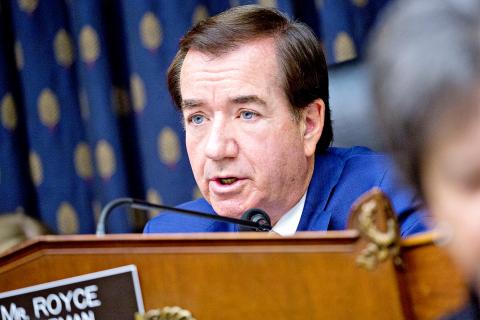The US House of Representatives on Thursday passed its annual defense spending bill for fiscal year 2019, which includes provisions to help strengthen Taiwan’s military capabilities.
The US$717 billion National Defense Authorization Act cleared the House 351-66.
Section 1253, titled “Strengthening Taiwan’s Force Readiness,” would direct the US secretary of defense to conduct a comprehensive assessment, in consultation with their Taiwanese counterparts, on ways to enhance and reform Taiwan’s military forces, particularly the reserve forces, the text of the bill published by the House says.

Photo: Bloomberg
The assessment would also require the development of recommendations to strengthen bilateral cooperation and improve Taiwan’s self-defense capabilities, it says.
The secretary of defense, in consultation with the US secretary of state, would be required to submit a report on the assessment and a list of recommendations and planned actions to the appropriate congressional committees no later than one year after the act is enacted, it says.
Section 1262, titled “Senior Defense Engagement with Taiwan,” would express the sense of US Congress that, pursuant to the Taiwan Travel Act, a service secretary or member of the US Joint Chiefs of Staff should visit Taiwan for senior-level defense engagement.
It would also require a briefing to the congressional defense and foreign affairs committees on any plans by the US Department of Defense to carry out senior-level defense engagement.
Separately on Thursday, several US lawmakers took to social media to express their concern and support for Taiwan after it lost another diplomatic ally, most likely because of China’s influence.
Burkina Faso earlier that day announced that it was severing diplomatic ties with Taiwan, citing “the interests of Burkina Faso and its people in the concert of nations,” Reuters reported.
US representatives Paul Gosar and Ted Yoho wrote in their posts that the US would stand with Taiwan in the face of Beijing’s pressure.
Gosar highlighted the nation’s virtues, calling it on Twitter “a strategic military and trade ally and a beacon in Asia,” and pledged to stand behind Taiwan and “its right to diplomatic relations.”
In addition to a message of support for Taiwan, Yoho also called out China for what he called its “two-faced aggression.”
He wrote that China’s minister of foreign affairs has said that the “US&China ‘should properly handle Taiwan,’” yet it continues to destabilize the Taiwan Strait with provocations, such as blocking Taiwan’s participation at this year’s World Health Assembly and poaching two of its allies in less than a month.
US Senator Marco Rubio said it was “regrettable Burkina Faso folded to China’s coercion and cut ties with Taiwan,” but warned that Beijing’s offers would come with strings attached, as it always puts its own authoritarian interests first.
House Committee on Foreign Affairs Chairman Ed Royce said on the committee’s Twitter account that he was “very concerned by concerted pressure campaign Taiwan is facing, including its exclusion from WHO.”
In response to the outpouring of support, Taiwan’s representative office in the US issued a statement expressing its thanks to Congress for its long-standing, firm support of the Taiwan-US friendship.

NATIONAL SECURITY THREAT: An official said that Guan Guan’s comments had gone beyond the threshold of free speech, as she advocated for the destruction of the ROC China-born media influencer Guan Guan’s (關關) residency permit has been revoked for repeatedly posting pro-China content that threatens national security, the National Immigration Agency said yesterday. Guan Guan has said many controversial things in her videos posted to Douyin (抖音), including “the red flag will soon be painted all over Taiwan” and “Taiwan is an inseparable part of China,” while expressing hope for expedited “reunification.” The agency received multiple reports alleging that Guan Guan had advocated for armed reunification last year. After investigating, the agency last month issued a notice requiring her to appear and account for her actions. Guan Guan appeared as required,

A strong cold air mass is expected to arrive tonight, bringing a change in weather and a drop in temperature, the Central Weather Administration (CWA) said. The coldest time would be early on Thursday morning, with temperatures in some areas dipping as low as 8°C, it said. Daytime highs yesterday were 22°C to 24°C in northern and eastern Taiwan, and about 25°C to 28°C in the central and southern regions, it said. However, nighttime lows would dip to about 15°C to 16°C in central and northern Taiwan as well as the northeast, and 17°C to 19°C elsewhere, it said. Tropical Storm Nokaen, currently

PAPERS, PLEASE: The gang exploited the high value of the passports, selling them at inflated prices to Chinese buyers, who would treat them as ‘invisibility cloaks’ The Yilan District Court has handed four members of a syndicate prison terms ranging from one year and two months to two years and two months for their involvement in a scheme to purchase Taiwanese passports and resell them abroad at a massive markup. A Chinese human smuggling syndicate purchased Taiwanese passports through local criminal networks, exploiting the passports’ visa-free travel privileges to turn a profit of more than 20 times the original price, the court said. Such criminal organizations enable people to impersonate Taiwanese when entering and exiting Taiwan and other countries, undermining social order and the credibility of the nation’s

‘SALAMI-SLICING’: Beijing’s ‘gray zone’ tactics around the Pratas Islands have been slowly intensifying, with the PLA testing Taiwan’s responses and limits, an expert said The Ministry of National Defense yesterday condemned an intrusion by a Chinese drone into the airspace of the Pratas Islands (Dongsha Islands, 東沙群島) as a serious disruption of regional peace. The ministry said it detected the Chinese surveillance and reconnaissance drone entering the southwestern parts of Taiwan’s air defense identification zone early yesterday, and it approached the Pratas Islands at 5:41am. The ministry said it immediately notified the garrison stationed in the area to enhance aerial surveillance and alert levels, and the drone was detected in the islands’ territorial airspace at 5:44am, maintaining an altitude outside the effective range of air-defense weaponry. Following